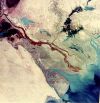Mediterranean Waters: Urban Infrastructure, Transdisciplinary Dialogue and Sustainable Futures
Institute for Advanced Studies @ Lancaster University
14th of November 2008
Sponsored by the Institute or Advanced Studies and CeMoRe.

Water as an intermediary, travelling through a multiplicity of socio-natural conduits, is known for the interconnectivity it produces across time and space, socio-natural worlds, generations, as well as cultural beliefs and values. And yet, we know much less about how to bring together different disciplinary understandings of water into strategies for effective sustainable water management. Nowhere is this more urgent than in the arid and semi-arid regions such as the Mediterranean, especially in the face of global climate change. Recurrent and persistent draughts, water shortages and infrastructure stress often become the norm rather than the exception in this area characterised by a recent history of overexploitation of ground and surface water resources, rapid coastal urbanisation, lack of planning and population growth.
These challenges have been brought together in the Blue Plan (2005), a United Nations Environment Programme study that has set future scenarios for the region. A pioneering initiative for its focus on a bio-region transcending national boundaries, since its beginnings the Blue Plan signals a growing trend in the use of prospective studies as a tool for environmental and development strategies and policies. A forward-looking approach is indeed increasingly seen as essential to effective governance in the face of swift global transformations and has been recognised as having great potential for addressing environmental issues, especially since the early 1980s with the shift in environmental and technological policies towards the preventive paradigm.
But,
• What does such a strategy represent? What are their strengths and weaknesses? Whose futures does it represent? Can we think of other alternative futures?
• What can we gain by discussing it from different disciplinary vantage points? Is there anything to be gained through an interdisciplinary gaze? What is lost in the process?
• Can strategies such as the Blue Plan be effective in reflecting and tackling the uneveness and injustice of current socio-environmental processes?
• Can we learn from such engagement of strategies for water governance in the Mediterranean region for the governance of socio-environmental processes more generally?
This workshop addresses these questions by focusing on water infrastructure, the socio-technical systems that make possible the circulation of water across places and borders.
This is the fourth in a series of workshops aimed at examining emergent socio-environmental landscapes in the Mediterranean region. By focusing on key issues such as tourism, migration, regionalisation, water, transport, the series aims at gaining a better understanding of the challenges facing the region in the 21st century. A guiding principle of the seminar series is that understanding future challenges and emergent socio-environmental landscapes requires a sensibility towards the longue durée of significant social, cultural, economic and technological processes.
The Institute for Advanced Studies is at Lancaster University (number 17 in map). For further practical information about travelling to Lancaster please click here.
Co-sponsored by the Centre
for Mobilities Research
and the Institute
for Advanced Studies







| Home | Mission
Statement | About Us | Networks
| Seminar Series | Events
|
| News |
Critical Mobilities | Contacts |

